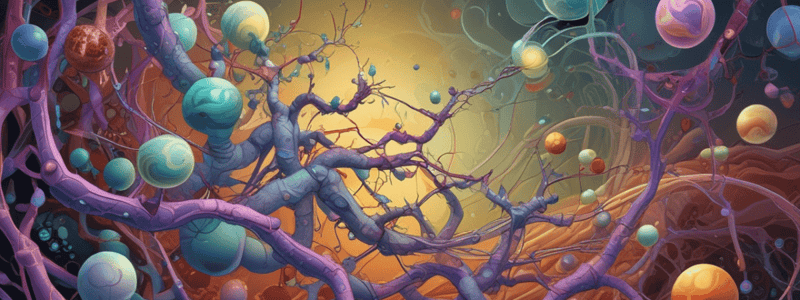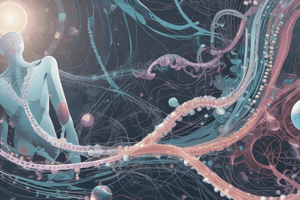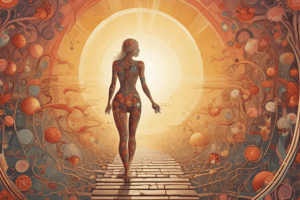Podcast
Questions and Answers
What is the main focus of the study on aging and longevity?
What is the main focus of the study on aging and longevity?
- Molecular repair processes and cellular countdown clocks
- Complex interplay between random and deterministic factors (correct)
- Wear and tear theories of aging
- Genetic programming and environmental stresses
What type of bonds link the head groups of phospholipids to their diacylglycerol partners?
What type of bonds link the head groups of phospholipids to their diacylglycerol partners?
- Glucosidic bonds
- Hydrogen bonds
- Ester bonds
- Phosphodiester bonds (correct)
What is essential for cell vitality?
What is essential for cell vitality?
- Cellular countdown clocks
- Programmed cell death
- Mitochondrial DNA repair
- Efficient production of ATP (correct)
What is a characteristic of wear and tear theories of aging?
What is a characteristic of wear and tear theories of aging?
What is a function of mitochondria in cells?
What is a function of mitochondria in cells?
What is a limitation of mitochondrial function?
What is a limitation of mitochondrial function?
What is a factor that influences aging and longevity?
What is a factor that influences aging and longevity?
What type of bonds bind fatty acids to their cognate glycerolipids?
What type of bonds bind fatty acids to their cognate glycerolipids?
What is a characteristic of the study on aging and longevity?
What is a characteristic of the study on aging and longevity?
What is a type of bond that links monosaccharide units of carbohydrates?
What is a type of bond that links monosaccharide units of carbohydrates?
What is the main consequence of advanced glycation end products (AGEs) on the body?
What is the main consequence of advanced glycation end products (AGEs) on the body?
What is the primary function of proofreading and repair mechanisms in DNA?
What is the primary function of proofreading and repair mechanisms in DNA?
According to the somatic mutation theory of aging, what drives the changes seen in the body as it grows older?
According to the somatic mutation theory of aging, what drives the changes seen in the body as it grows older?
What is the role of isoaspartyl methyltransferase in protein modification?
What is the role of isoaspartyl methyltransferase in protein modification?
What is the relationship between lifespan and body mass in mammals?
What is the relationship between lifespan and body mass in mammals?
What is the consequence of telomere shortening in somatic cells?
What is the consequence of telomere shortening in somatic cells?
What are the primary pathological conditions associated with advanced glycation end products (AGEs)?
What are the primary pathological conditions associated with advanced glycation end products (AGEs)?
What is the primary mechanism of DNA repair mechanisms?
What is the primary mechanism of DNA repair mechanisms?
What is the primary consequence of mutations in healthy cells according to the somatic mutation theory of aging?
What is the primary consequence of mutations in healthy cells according to the somatic mutation theory of aging?
What is the primary function of telomeres in eukaryotic cells?
What is the primary function of telomeres in eukaryotic cells?
Study Notes
Aging and Longevity
- Aging and longevity are controlled by the complex interplay between genetic programming, environmental stresses, lifestyle, cellular countdown clocks, and molecular repair processes.
Wear and Tear Theories of Aging
- These theories hypothesize that the changes associated with old age and death reflect the accumulation of damage over time.
Molecular Bonds
- Ester bonds bind fatty acids to their cognate glycerolipids.
- Glucosidic bonds link the monosaccharide units of carbohydrates.
- Phosphodiester bonds hold polynucleotides together and link the head groups of phospholipids to their diacylglycerol partners.
Mitochondria and ATP Production
- Efficient production of ATP is essential to cell vitality.
- Mitochondria play a central role in apoptosis, programmed cell death.
- Mitochondria lack the capacity to repair damage to their DNA.
Advanced Glycation End Products (AGEs)
- AGEs are potentially harmful and heterogeneous molecules derived from nonenzymatic glycation.
- The pathological implications of AGEs are ascribed to their ability to promote oxidative stress, inflammation, and apoptosis.
- AGEs are important in the development and progression of various aging-related pathological conditions, such as diabetes, cardiovascular complications, and neurodegenerative diseases.
DNA Repair
- The integrity of DNA is maintained by proofreading and repair mechanisms.
- Mutations resulting from errors can be particularly harmful, leading to oncogenic transformation or rendering a cell vulnerable to further damage.
Somatic Mutation Theory of Aging
- The changes seen in the body as it grows older are driven by the gradual accumulation of small mutations in the DNA of healthy cells.
- Healthy cells can tolerate many mutations.
Isoaspartyl Linkage and Repair
- Formation of an isoaspartyl linkage in a polypeptide backbone and its repair via the intervention of isoaspartyl methyltransferase.
Telomeres and Chromosome Length
- In eukaryotic cells, telomeres cap the ends of their linear chromosomes and progressively shorten each time a somatic cell divides.
Studying That Suits You
Use AI to generate personalized quizzes and flashcards to suit your learning preferences.
Related Documents
Description
Explore the complex interplay of factors that control aging and longevity, including genetic programming, environmental stresses, and molecular repair processes. Learn about wear and tear theories of aging and the importance of molecular bonds.




